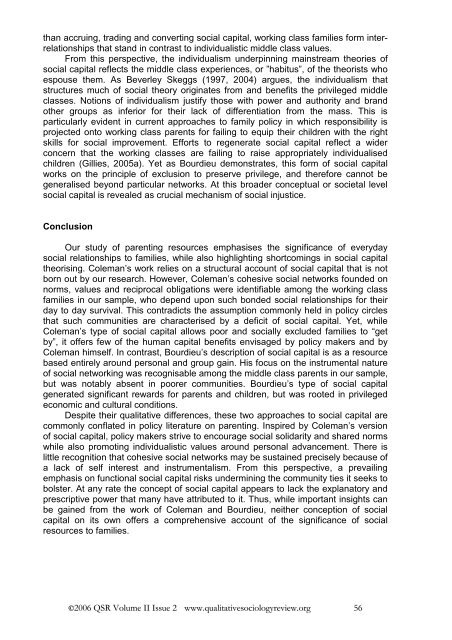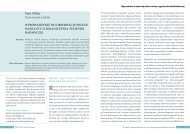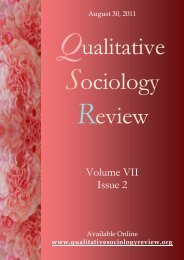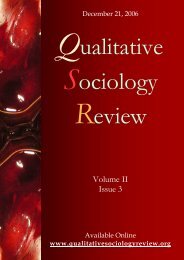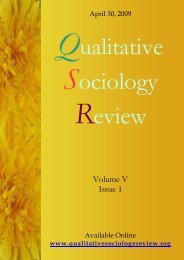Gillies, V. and Edwards, R. - Qualitative Sociology Review
Gillies, V. and Edwards, R. - Qualitative Sociology Review
Gillies, V. and Edwards, R. - Qualitative Sociology Review
Create successful ePaper yourself
Turn your PDF publications into a flip-book with our unique Google optimized e-Paper software.
than accruing, trading <strong>and</strong> converting social capital, working class families form interrelationships<br />
that st<strong>and</strong> in contrast to individualistic middle class values.<br />
From this perspective, the individualism underpinning mainstream theories of<br />
social capital reflects the middle class experiences, or ”habitus”, of the theorists who<br />
espouse them. As Beverley Skeggs (1997, 2004) argues, the individualism that<br />
structures much of social theory originates from <strong>and</strong> benefits the privileged middle<br />
classes. Notions of individualism justify those with power <strong>and</strong> authority <strong>and</strong> br<strong>and</strong><br />
other groups as inferior for their lack of differentiation from the mass. This is<br />
particularly evident in current approaches to family policy in which responsibility is<br />
projected onto working class parents for failing to equip their children with the right<br />
skills for social improvement. Efforts to regenerate social capital reflect a wider<br />
concern that the working classes are failing to raise appropriately individualised<br />
children (<strong>Gillies</strong>, 2005a). Yet as Bourdieu demonstrates, this form of social capital<br />
works on the principle of exclusion to preserve privilege, <strong>and</strong> therefore cannot be<br />
generalised beyond particular networks. At this broader conceptual or societal level<br />
social capital is revealed as crucial mechanism of social injustice.<br />
Conclusion<br />
Our study of parenting resources emphasises the significance of everyday<br />
social relationships to families, while also highlighting shortcomings in social capital<br />
theorising. Coleman’s work relies on a structural account of social capital that is not<br />
born out by our research. However, Coleman’s cohesive social networks founded on<br />
norms, values <strong>and</strong> reciprocal obligations were identifiable among the working class<br />
families in our sample, who depend upon such bonded social relationships for their<br />
day to day survival. This contradicts the assumption commonly held in policy circles<br />
that such communities are characterised by a deficit of social capital. Yet, while<br />
Coleman’s type of social capital allows poor <strong>and</strong> socially excluded families to “get<br />
by”, it offers few of the human capital benefits envisaged by policy makers <strong>and</strong> by<br />
Coleman himself. In contrast, Bourdieu’s description of social capital is as a resource<br />
based entirely around personal <strong>and</strong> group gain. His focus on the instrumental nature<br />
of social networking was recognisable among the middle class parents in our sample,<br />
but was notably absent in poorer communities. Bourdieu’s type of social capital<br />
generated significant rewards for parents <strong>and</strong> children, but was rooted in privileged<br />
economic <strong>and</strong> cultural conditions.<br />
Despite their qualitative differences, these two approaches to social capital are<br />
commonly conflated in policy literature on parenting. Inspired by Coleman’s version<br />
of social capital, policy makers strive to encourage social solidarity <strong>and</strong> shared norms<br />
while also promoting individualistic values around personal advancement. There is<br />
little recognition that cohesive social networks may be sustained precisely because of<br />
a lack of self interest <strong>and</strong> instrumentalism. From this perspective, a prevailing<br />
emphasis on functional social capital risks undermining the community ties it seeks to<br />
bolster. At any rate the concept of social capital appears to lack the explanatory <strong>and</strong><br />
prescriptive power that many have attributed to it. Thus, while important insights can<br />
be gained from the work of Coleman <strong>and</strong> Bourdieu, neither conception of social<br />
capital on its own offers a comprehensive account of the significance of social<br />
resources to families.<br />
©2006 QSR Volume II Issue 2 www.qualitativesociologyreview.org 56


